Animals Who Can Survive Without Water For All Months
In this world, almost all living things need water. And many people say that water is the source of life and the grace of nature that we should be grateful for. However, it turns out that on this earth there are many areas that do not have adequate supply or water source, there are areas that are very arid and very difficult to get the water source. So be thankful we are living in an area that allows us to get abundant water.
In the discussion this time we will review some types of animals that have their own uniqueness and advantages, ie they are able to survive for months without consuming water at all. It sounds strange and unlikely, but the animals do exist and are created in this world. The advantages that these animals possess are the result of thousands of years of adaptation, where it is conditioned to live and struggle in areas with very little water resources, so nature allows them to become the species of animals that have these advantages. What are the species of these animals? Let's look together:
1.Thorny Devil Lizard
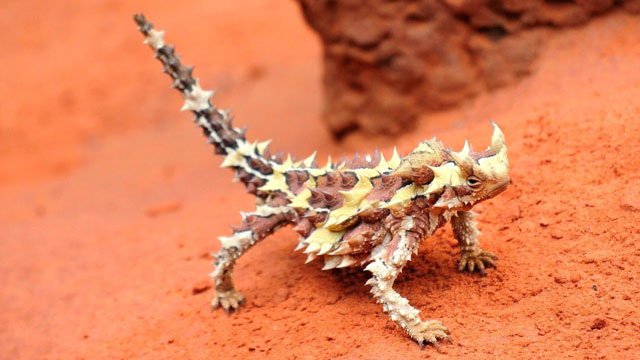
Lizards that enter as a species of desert dwellers is from the Australian continent. Where the original habitat is a red desert land that is very arid. In addition, this one lizard is also nicknamed "The Thorn Devil". So called because this lizard has a rather horrible appearance with many sharp thorns all over his body. The lizard is known for its unique and special ability, that is, it is able to absorb water through its skin layers. Heritimewanya, this one lizard is the only species species in the genus.
Besides being filled with sharp spines all over his body, this lizard is also able to change the color of his skin to various different colors. He can change color from dark brown to bright yellow, or a slightly reddish brown color, and also even change the color to a jet black color. The change of color has a purpose to disguise itself with the color around it. And uniquely, in addition to changing color, this one lizard is also equipped with a fake head on the shoulder, whose function is to be able to outwit predators of predators.
The uniqueness of thorny lizards increases when the team of scientists successfully learn the ability of adaptation of this animal as a desert dweller. The thorny lizard was able to utilize its skin to absorb the dew present in the sand. The researchers have also successfully tested it, that the most special survival mechanism of this lizard is when the lizard's skin is able to suck water from a puddle, or from moist sand containing water. The researchers say that the lizard's skin structure consists of microstructures that are structured together with thousands of capillary channels. The capillary channels are arranged in overlap with the growth of the scales, so it is possible that this lizard can collect water by absorption like a sponge, which is then transported into the oral cavity in order to enter the digestive system.
In the vastness of the arid desert of Australia it is very rare to find puddles, let alone water sources. Because of that, which ultimately makes this lizard very impossible to use the mouth cavity to drink water. So, to be able to drink water, this one spiny lizard will stand on the sand that he feels moist, then he will rub his back and stomach, in order to make the process of absorption of moisture he needs to survive. This amazing ability makes the lizard survive amid the arid desert of Australia, and that way the lizard can keep its water reserves for some time to come.
2.Dorcas Gazelle
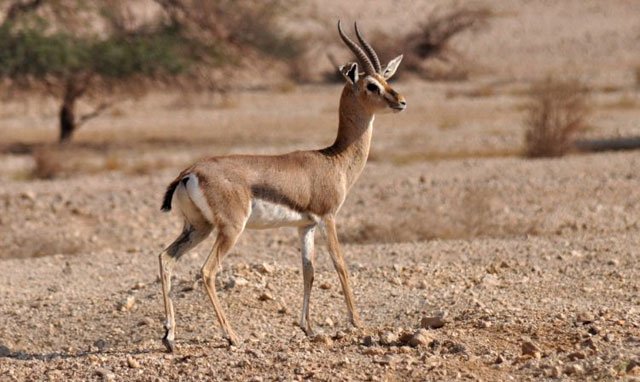
This one animal at first glance looks like an antelope indeed, but he is very different from the antelope. This animal has a strange evolutionary development in terms of survival, where its original habitat is in the hot, very dry Saudi Arabia desert. It is in the habits that they evolve by reducing the volume of some organs that require oxygen intake. The volume of the heart's organ and liver organ shrinks by 20 to 45%, thus allowing them not to breathe in too much and need oxygen. Because, the less they breathe, the less water needs are needed.
Dorcas Gazelle or often called deer dorcas is an indigenous species in the barren and arid regions, the dorcas deer must inevitably be able to adapt to the extreme conditions of its habitat, in order to enable them to survive even with little water. In fact, reportedly they are also able to survive with no drinking water at all, the fluid needs they need usually they can from the intake of some kind of plants that they eat. When the liquid in the body is running out, the deer dorcas can save water by concentrating on uric acid levels, after which they remove a kind of pellet, not urine. This ability is very effective in saving the amount of fluid present in their body.
3.Camel
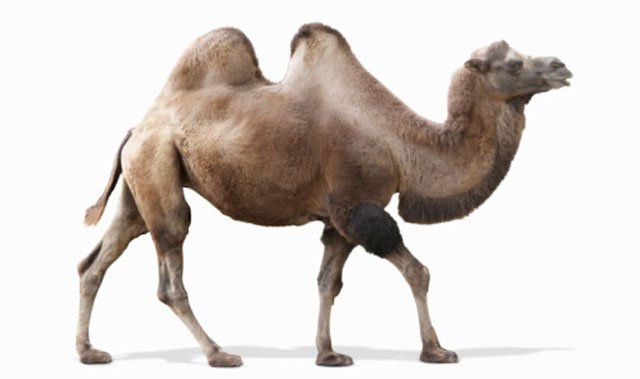
Most of you must already know and know this humped animal enis this one. Camel is very popular in the world, and he is known as a "desert vehicle", because he is able to carry a very heavy burden when crossing the vastness of the desert. This camel animal is also well known as one of the animals that can survive in the wild, barren and dry, and has a very limited supply of water. A very distinctive feature of this camel's dai is that he has a hump that serves as a fat storage, which he will use as a food reserve for the next season. Uniquely, a baby camel will not have a hump until they can eat solid food.
Well, the main advantage of this animal is its ability to store water reserves. However, with false yes, camels do not keep their water reserves in their humps, but they store them in the form of body fluids, the other in the bloodstream. From there, an adult camel can drink water up to 200 liters at one drink. They are also good at drinking water quickly, they are able to drink 100 liters of water in a matter of 10 minutes. And most strangely, camels are not the type of water problem chooser, because they can drink brackish water and salt water though. Besides being able to drink plenty of water, the camel is also equipped with special abilities in its body, that is to minimize the need for water, with the aim that the water he has been drinking can last for months.
Unlike warm-blooded animals in general, the camel's body temperature can change by adjusting to its ambient temperature conditions. The temperature of the camel body varies, between 35 ° C to 40 ° C, it is to help the camel to minimize the water requirement in its body. Camel also has a very amazing ability to avoid dehydration conditions. Where most animals would die by the time they lose 20% of the fluid, the crazy madness can survive despite the loss of fluid up to 40%. In extreme conditions when in the desert, camels can lower their body temperature quickly, so that's why the fat reserves are stored only in the hump, in order to easily throw the hot temperature in the body when the desert temperature is very hot.
4.The Galapagos Tortoise
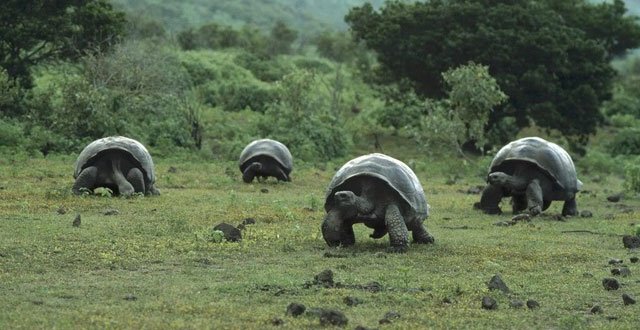
Turtles are one of the animals known as animals that move very slowly. Tidi world is a lot of species of turtles of various kinds, one of which is a giant tortoise Galapagos. This one turtle is moving very slowly, which is only about 0.16 miles per hour. The wild Galapagos turtles can be found in the Galapagos Islands region, west of Ecuador, South America. This species is the largest species of turtle in the world, even can weigh up to 600 kilograms, then the length can reach 2 meters, from head to tail. And uniquely, this species of turtles can survive to reach the age of 150 years more.
To survive in extreme conditions in the Galapagos archipelago, this gigantic tortoise proved to live without food and water for up to a year. These tortoise foods are usually several types of cactus, some types of barren fruits, grasses, leaves, and some types of plants that propagate. The body of the tortoise is proven to store food reserves and water reserves for a long time. Formerly, this Galapagos tortoise was used as a source of food for pirates, hunters, and local fishermen. However, due to its perceived diminution, the tortoise now enters one of the most protected animals.
5.Kangaroo rat
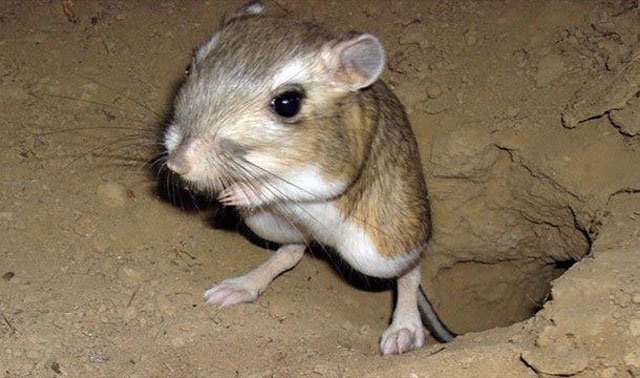
The kangaroo rat also has a famous name, "Jerboa". Where they also enter into one type of animal that can survive without drinking water for a long time. This mice has the size of other types of mice, but what distinguishes him from other mice is his body shape which is very similar to a kangaroo, with the legs dangling backwards, da also the shape of the hand that bends forward. This type of mouse proved more thirst-resistant when compared with camel animals. The habitat of this rat is a desert, so that makes him able to survive even though not drinking water for a year, incredible.
These small mammals can survive by eating only high-carbohydrate foods, such as grains. The high-protein food he uses to produce special energy, so he can survive without drinking water for some time. The body of this mouse is adapted in such a way to save water. In his cheek pouch, there is no saliva at all, alias dry, and its function is just to memamah grain only. Not only that, kangaroo rats are also equipped with a sophisticated special kidney, where in it there is a kind of system that allows to extract water from urine fluid, with the aim that he can use again for his body's water needs. As a result, there is no liquid that he wasted all his life. This little rat is more thirsty in drinking water, where he can drink water reaches one third of his body weight. This rat can also survive with no food and drink at all, for 9 days in temperature 50o Celsius.
Reference :
https://www.nationalgeographic.com
https://www.google.co.id/amp/s/m.recipes.timesofindia.com/articles/features/10-animals-that-can-live-without-food-and-water-for-months/surprise/amp_photostory/62636199.cms
https://www.oliversozone.com/blog/which-animals-can-last-the-longest-without-water/
Tisko Bot
Send 0.200 Steem or 0.200 SBD and the URL in the memo to @tisko to use the bot for a resteem and to get 5 good upvots.
Click here to see how to use Tisko Bot.